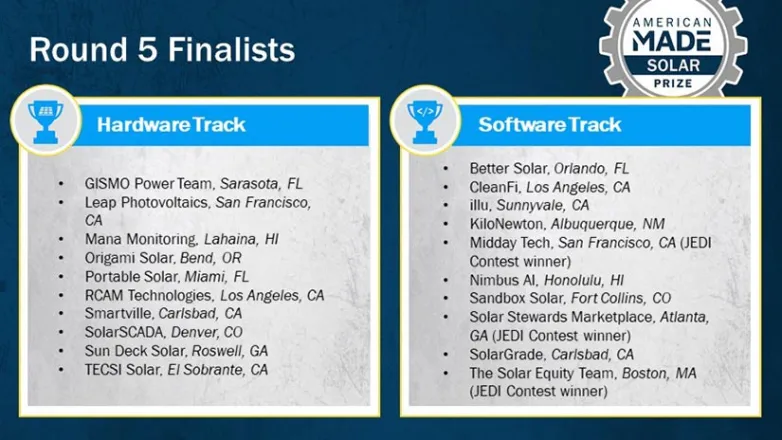United States DOE announces 20 finalists for its American-Made Solar Prize, cash prizes as well as assistance supplied
- The United States Department of Energy (DOE) has revealed the 20 finalists moving forward in its American-Made Solar Prize Round 5, which will certainly see 10 hardware-focused and also 10 software-focused teams relocate via to the following round and also get cash prizes.

The American-Made Solar Prize was made to sustain innovations in the solar sector that can aid construct a much better, extra reliable as well as durable solar future. Competitors are tasked with determining a solar industry obstacle as well as developing a commercially viable remedy in the span of months.
The competition is made up of 3 different rounds-- Ready!, Set! and Go!-- with effective firms progressing with each round and also building up cash prizes as well as assistance from development assistance organisation America-Made Network participant as they go. For the first time under Round 5, software technologies have actually been consisted of in the competition.
Each equipment finalist obtained US$ 100,000 in cash prizes as well as US$ 75,000 in vouchers to advance their innovation from proof-of-concept to prototype in the last contest. Software track finalists received US$ 60,000 each. 3 software teams got an additional US$ 33,333 for winning the optional JEDI Contest.
" We require all trendsetters currently especially if we're going to increase solar's accessibility to Americans as well as fulfill our net-zero objectives," said Garrett Nilsen, acting director of the DOE Solar Power Technologies Office. "Congratulations to these teams, and we eagerly anticipate seeing where they can take their products."
The hardware companies moving on in the competition as well as the products they are dealing with are as follows:
- Gismo Power, Florida-- establishing a portable carport that has an integrated solar PV system as well as electrical automobile (EV) battery charger that can be saved in a garage.
- Jump Photovoltaics, California-- developing a silicon solar cell that utilizes silicon particles instead of conventional silicon wafers.
- Mana Tracking, Hawaii-- creating a plug-and-play energy management system that synchronises on-site solar power generation with electrical automobile billing.
- Origami Solar, Oregon-- establishing steel PV module frames made utilizing a roll-forming process.
- Portable Solar, Florida-- creating an awning PV panel placing system that can incorporate into the production procedure as well as circulation channels of the manufactured house market.
- RCAM Technologies, California-- establishing 3D-printed concrete gravity supports that are made on-site for floating solar panel setups.
- Smartville, California-- developing an energy storage space system that integrates recycled EV batteries with a novel power conversion system and battery controls.
- Solar SCADA, Colorado-- creating a managerial control and data procurement (SCADA) system that incorporates all the sensing units, calibration, communication and data feeds required to run a solar power system right into standalone, ready-to-use packages.
- Sunlight Deck Solar, Georgia-- creating a solar-powered EV billing terminal that utilises a self-assembling style to lower installation costs.
- TECSI Solar Inc., California-- creating a solar panel created for residential usage, which streamlines the getting and installation process by incorporating the racking, flashing, equipment and power electronic devices right into a solitary item.
The ten software finalists were:
- Better Solar, Florida-- building maker vision software to procedure electroluminescence imagery and also automatically identify PV defects with application to both PV module manufacturing as well as PV plant upkeep.
- CleanFi, California-- creating a platform that looks for to automate solar project funding for the small-and-midscale commercial sector, including helping with making use of commercial residential or commercial property assessed tidy energy.
- Illu, California-- building a mobile and also desktop computer tool for operations as well as maintenance (O&M) workflow monitoring that will certainly aid field service technicians as well as simplify dispersed solar upkeep.
- KiloNewton, New Mexico-- developing geospatial software to efficiently website utility-scale solar and also stay clear of difficult terrain.
- Midday Tech, California-- constructing a platform to link customers that buy voluntary carbon offsets with high-impact rooftop solar projects in underserved communities. (JEDI Contest victor).
- Nimbus AI, Hawaii-- producing day-ahead probabilistic solar irradiance forecasts leveraging current advancements in satellite imagery and also progressed machine learning.
- Sandbox Solar, Colorado-- structure software to help design agrivoltaic projects, with a focus on replicating the microclimates under solar modules as well as forecasting crop development returns.
- SolarGrade, California-- constructing a workflow management platform to assist in inspection and O&M of PV systems leveraging area specialist inputs and also data analytics.
- Solar Stewards Marketplace, Georgia-- creating a marketplace for a new kind of renewable energy credit history (REC), a social REC, that enables business buyers to acquire RECs produced in underserved communities. (JEDI Contest victor).
- The Solar Equity Team, Massachusetts-- creating a platform that connects bigger installments that have surplus solar generation with non-profits and also underserved customers to enable a very easy peer-to-peer credit report sharing transaction. (JEDI Contest champion).
The 20 finalists will certainly offer their technologies next off at the final Go! Demo Day in September. Only 2 teams in each track will certainly win the final prize, each getting also bigger cash prizes as well as assistance vouchers to help bring their modern technology to market.
Also read

